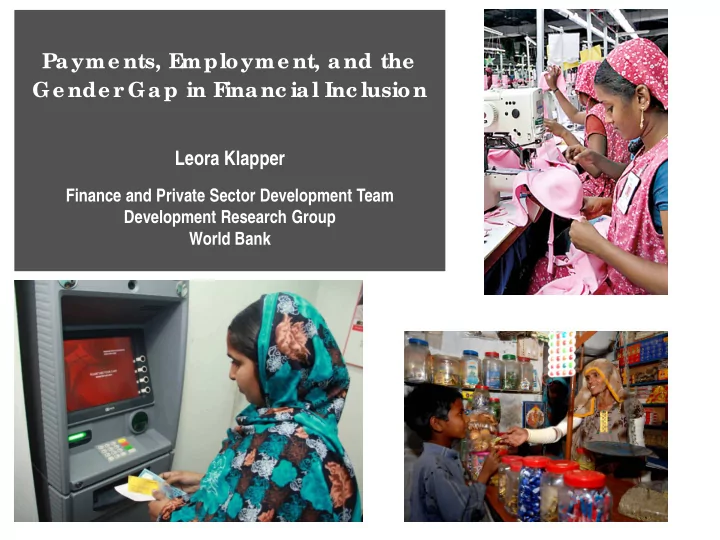

Payme nts, E mployme nt, and the Ge nde r Gap in F inanc ial Inc lusion Leora Klapper Finance and Private Sector Development Team Development Research Group World Bank
Accounts can offer women security, privacy, and control of their $$$…. Account ownership Total percentage of adults WOMEN MEN 65% 72% Brazil 76% 81% China 43% 63% India Mexico 39% 39% 34% 54% Nigeria 70% Russian Federation 64% 70% South Africa 70% 44% Turkey 69% Developing economies 59% 50% 95% 95% G7 economies Source: Global Findex (2014); http://www.worldbank.org/globalfindex
Depending on Workforce (Non-)Participation…. Account ownership by economic participation in BRIC countries Total Percentage of Adults in BRIC Countries WOMEN MEN Self- Wage Self- Wage employed workers employed workers 79% banked 70% banked 77% banked 76% banked Unemployed The Gender Gap in Financial Inclusion Out of Out of workforce workforce 49% banked 62% banked Unemployed Source: Gallup World Poll and Global Findex (2014); http://www.worldbank.org/globalfindex
Depending on use of accounts…. Wages and government transfers to Women Total percentage of women Receives Receives Receives govt public private transfers wages into 90% wages into into an an account an account account 80% 70% 60% 50% 40% 30% 20% 10% 0% Brazil China India Mexico Russian Federation South Africa Source: Findex (2014); http://www.worldbank.org/globalfindex Note: The height of the bar is the share of adults with an account .
Depending on mode of access/payments…. Technology Gender Gaps In Turkey 57% of women have a Total percentage of women mobile phone as well as the internet, vs. 76% of men 100% 90% Does not have 80% a mobile phone 70% 60% Has mobile 50% phone 40% 30% Has mobile phone & 20% internet 10% 0% Brazil China India Kenya Mexico Russian Turkey Federation Source: Gallup World Poll (2016). Note: The height of the bar is the share of adults who have their own mobile phone .
… or formality can reveal women's’ $$ Have an account: Do you, either by yourself or together with someone else, currently have an account? Debit card in your own name: Do you, personally, have (a [insert local terminology for ATM/debit card])? Linked to an account in your name: Is this [insert local terminology for ATM/debit card] connected to an account with your name on it? Do you own a business? Does anyone else have access to your card or pin number? What family members know your monthly wages? Do you share your monthly wage slip with any family members? Do other family members keep track of overtime wages? Who has access to your bank statements?
Questions for Discussion 1) What specific issues have you experienced with survey questions/modules measuring financial inclusion and labor market participation, and what practical improvements would you recommend? 2) What kind of validation exercises have you conducted on your instruments and how were these helpful? Are there specific strategies you would recommend? 3) Are there alternative indicators that would get us closer to what we want to measure about women’s empowerment?
Recommend
More recommend